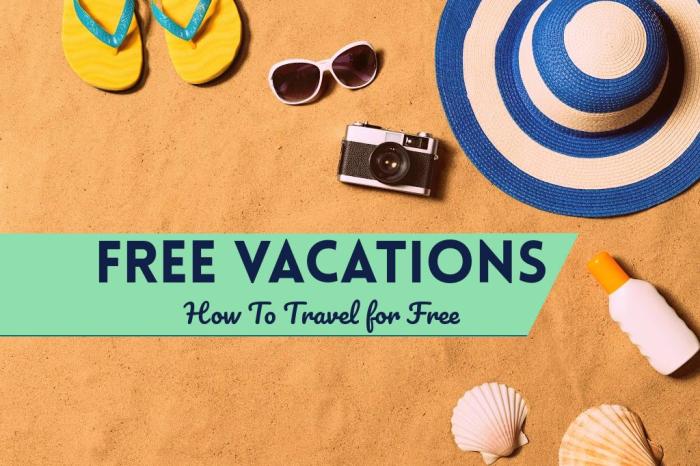Free Vacations For Veterans: The program offers respite and rejuvenation to those who have served, providing much-needed relaxation and opportunities for recovery. This in-depth guide navigates the eligibility requirements, application processes, and types of vacations available through various organizations, shedding light on a crucial support system for veterans. We delve into the specifics of accessing these benefits, examining both the advantages and challenges veterans may encounter.
From serene resort stays to adventurous outdoor excursions, the range of vacations caters to diverse preferences. Understanding the eligibility criteria—which vary across organizations—is key to successfully applying. This guide aims to demystify the process, empowering veterans to access the well-deserved rest and recuperation they’ve earned.
Potential Challenges and Solutions for Veterans

Accessing free vacation programs designed for veterans often presents a unique set of hurdles. These challenges stem from factors ranging from bureaucratic complexities to the veterans’ individual circumstances and needs. Successfully navigating these obstacles requires a multi-pronged approach involving program improvements, increased veteran awareness, and robust support networks.
Navigating Application Processes
Many veterans face difficulties understanding and completing the often-complex application processes for free vacation programs. Applications frequently require extensive documentation, specific medical information, and detailed personal details. This can be particularly challenging for veterans with disabilities or those struggling with PTSD or other mental health conditions. Furthermore, the sheer number of different programs and their varying eligibility criteria can be overwhelming.
Solutions include streamlined, user-friendly online applications with clear instructions and readily available assistance. Organizations offering these programs should consider offering multilingual support and incorporating accessible design principles for veterans with disabilities. Partnering with veteran service organizations to provide application assistance would significantly improve accessibility.
Financial and Logistical Barriers, Free Vacations For Veterans
Even when eligible, financial and logistical constraints can prevent veterans from taking advantage of free vacation programs. Transportation costs to and from the vacation destination can be prohibitive for some. Additionally, veterans may require specialized accommodations or assistance due to disabilities or medical conditions. The programs themselves should actively address these challenges. This might involve providing transportation stipends or partnering with organizations that offer accessible travel options.
Furthermore, programs should clearly Artikel what accommodations they can provide and what additional support veterans might need to secure independently. Transparency and proactive communication are key.
Addressing Mental Health Concerns
Veterans may be hesitant to participate in group vacation programs due to concerns about their mental health or social anxieties. PTSD, depression, and other mental health conditions can significantly impact a veteran’s ability to engage in social situations or travel independently. To address this, programs should offer options for individual or small-group vacations, allowing veterans to participate at a pace that feels comfortable.
Moreover, providing access to mental health professionals or counselors throughout the vacation experience can greatly enhance the overall benefit and reduce anxiety. Clear communication regarding available support systems is crucial for building trust and encouraging participation.
The Importance of Advocacy and Support Networks
Effective advocacy and robust support networks are paramount to ensuring veterans can access and benefit from free vacation programs. Veteran service organizations play a crucial role in raising awareness about available programs, providing assistance with applications, and advocating for program improvements. These organizations can also serve as a vital link between veterans and the providers of these programs, addressing individual needs and concerns.
A strong support network helps to build trust, reduces feelings of isolation, and ensures that veterans feel empowered to take advantage of the opportunities available to them. This collaborative approach is vital for maximizing the positive impact of these programs.
Visual Representation of a Typical Veteran Vacation Experience: Free Vacations For Veterans

The sights, sounds, and feelings associated with a veteran’s free vacation are multifaceted, reflecting both the restorative power of rest and the lingering impact of service. The experience transcends a simple holiday; it’s a journey of healing and rediscovery, a chance to reconnect with oneself and the world outside the often-demanding realities of military life.The visual experience could begin with the warm glow of a sunrise over a tranquil beach, the gentle lapping of waves a soothing counterpoint to the often-jarring sounds of past deployments.
Imagine a veteran, perhaps sitting on a sun-drenched deck, a steaming cup of coffee in hand, the salty air filling their lungs. The sounds of birdsong and children playing replace the sounds of gunfire and sirens, a welcome change offering a sense of peace and normalcy. The feeling is one of profound relaxation, a release of tension held for years, a sense of being present in the moment, rather than constantly vigilant.
Sensory Details and Emotional Impact
The visual landscape might shift from a beach to a mountain vista, the crisp mountain air invigorating, the vastness of the scenery a powerful reminder of the world’s beauty and resilience. The veteran might be hiking a trail, the rhythmic sound of their footsteps a grounding experience, the scent of pine needles and wildflowers filling the air. The tactile sensations – the rough bark of a tree, the soft earth beneath their feet – ground them in the present, offering a physical connection to the natural world.
The emotional impact of such experiences is substantial. The overwhelming sense of peace and calm can help alleviate PTSD symptoms, while the feeling of being cared for and appreciated fosters a sense of self-worth and belonging. The vacation becomes a powerful symbol of gratitude and recognition for their service and sacrifice. This sensory immersion fosters a sense of renewal, offering a tangible escape from the mental and emotional burdens that often accompany military life.
The simple act of unwinding, without the constant pressure of duty or the threat of danger, is profoundly restorative.
Securing a free vacation as a veteran requires navigating a landscape of diverse programs and eligibility requirements. However, by understanding the process, utilizing available resources, and potentially seeking assistance from support networks, veterans can significantly improve their chances of accessing these beneficial programs. The rewards—rest, relaxation, and improved well-being—are substantial, underscoring the importance of these initiatives in supporting the nation’s heroes.

